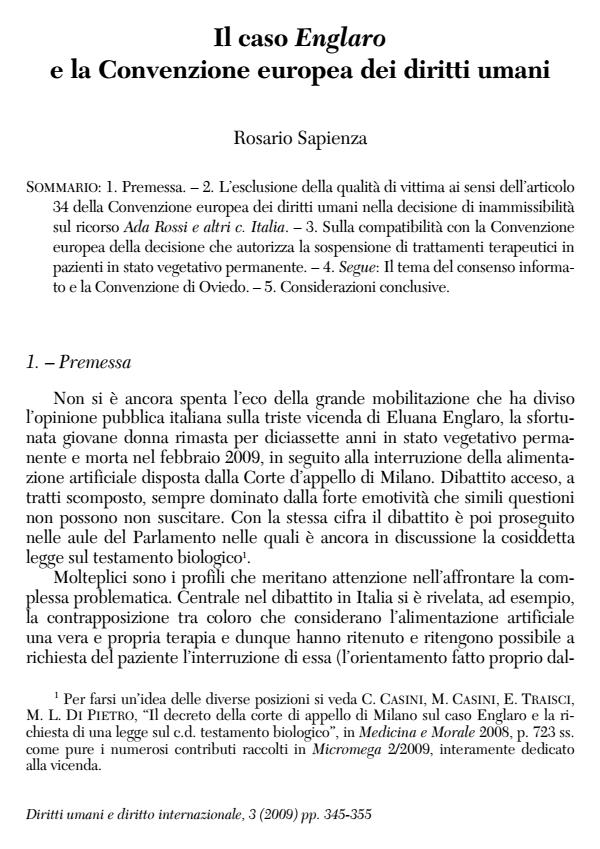Il caso Englaro e la Convenzione europea dei diritti umani
Titolo Rivista DIRITTI UMANI E DIRITTO INTERNAZIONALE
Autori/Curatori Rosario Sapienza
Anno di pubblicazione 2009 Fascicolo 2009/2
Lingua Italiano Numero pagine 11 P. 345-355 Dimensione file 109 KB
DOI 10.3280/DUDI2009-002007
Il DOI è il codice a barre della proprietà intellettuale: per saperne di più
clicca qui
Qui sotto puoi vedere in anteprima la prima pagina di questo articolo.
Se questo articolo ti interessa, lo puoi acquistare (e scaricare in formato pdf) seguendo le facili indicazioni per acquistare il download credit. Acquista Download Credits per scaricare questo Articolo in formato PDF

FrancoAngeli è membro della Publishers International Linking Association, Inc (PILA)associazione indipendente e non profit per facilitare (attraverso i servizi tecnologici implementati da CrossRef.org) l’accesso degli studiosi ai contenuti digitali nelle pubblicazioni professionali e scientifiche
The Englaro case and the European Convention on Human Rights - In a decision issued in December 2008, a Chamber of the European Court of Human Rights declared inadmissible eight joined applications in the case of Ada Rossi and Others v. Italy (applications nos. 55185/08, 55483/08, 55516/08, 55519/08, 56010/08, 56278/08, 58420/08 and 58424/08). The applications were lodged by six Italian disabled persons, represented by their guardians, and six Italian associations made of relatives and of medical personnel who assist the persons concerned. They complained that the decision issued on June 2008 by the Court of Appeal of Milan, by which Beppino Englaro (father and guardian of Eluana Englaro, the comatose woman at the centre of an euthanasia debate that has divided Italy) was granted the authorization to discontinue his daughter’s artificial nutrition and hydration, could eventually have adverse effects on their situations. The Chamber concluded that the applicants could not claim to be victims, neither direct nor potential, of the decision and therefore concluded for the inadmissibility of the application. Our comment, while approving the Chamber inadmissibility decision, goes into the matter recalling previous case-law by the Court and showing that there could have possibly been a case for application of article 8 of the Convention (which, however, was not relied on by the applicants).
Rosario Sapienza, Il caso Englaro e la Convenzione europea dei diritti umani in "DIRITTI UMANI E DIRITTO INTERNAZIONALE" 2/2009, pp 345-355, DOI: 10.3280/DUDI2009-002007